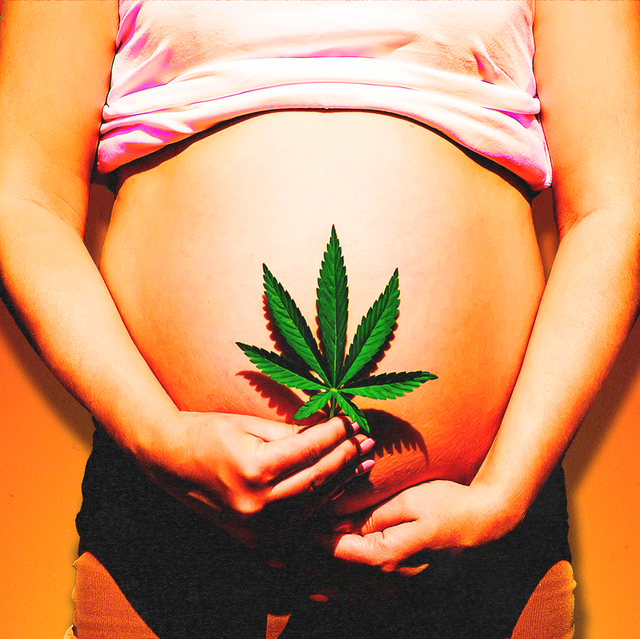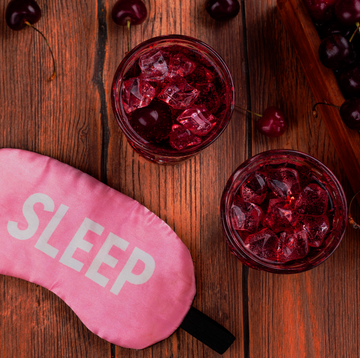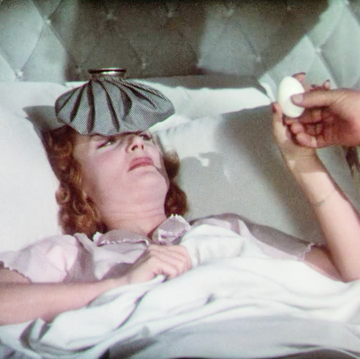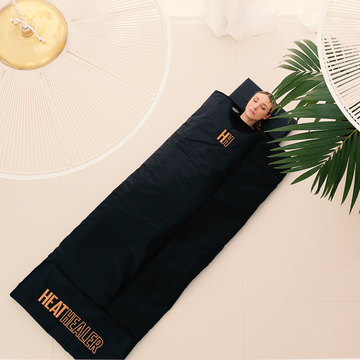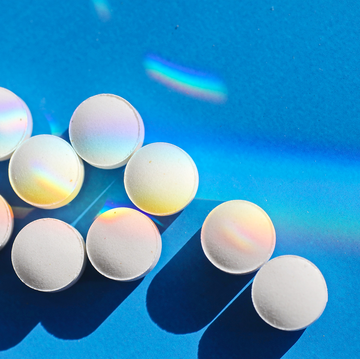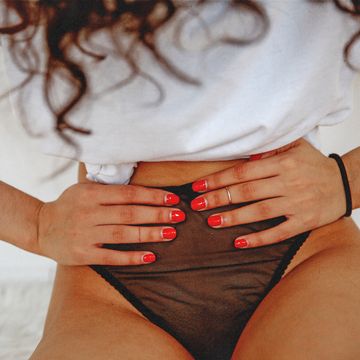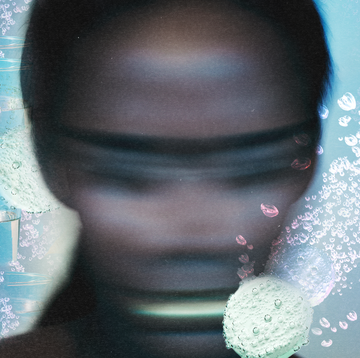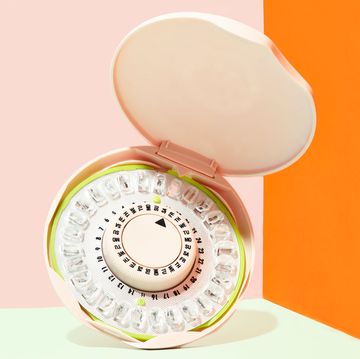Ask anyone who’s been through it: Pregnancy can be uncomfortable. For some, nearly unbearable. So it makes sense that throughout history, women have tried just about everything to minimize pain, from swallowing dry starch to treat vomiting in the medieval era to drinking straight vinegar and baking soda to curb heartburn in the ’90s.
Now that we’ve arrived in the 2020s, more and more pregnant people are reaching for cannabis and its active ingredients, THC and CBD for a little relief. And just as a refresher, THC—commonly referred to as “weed”—is the chemical that causes highs. CBD is not mind-altering and is generally considered safer. Both have therapeutic properties and are sometimes used to treat things like inflammation and sore muscles. We’re using “cannabis” in this story to talk about products that contain THC or CBD because pregnant consumers may use either compound, depending on their ailment and its severity.
Cannabis use during pregnancy has more than doubled in the past two decades, partially due to booming availability from the legalization that’s swept the country and partially because cannamoms, as they call themselves, often consider cannabis—versus doctor-prescribed pharmaceuticals—to be the better, more natural medicine for relieving anxiety, depression, vomiting, chronic pain, and other symptoms. Of course, it’s not without its own risks.
For starters, most doctors aren’t exactly on board, citing potential health concerns, primarily for the fetus. There’s also major social stigma (have you seen the way people look at a pregnant woman having the occasional glass of wine? Yeah, that times 10). Plus, in nearly half of states, testing positive for THC after giving birth may spark a visit from Child Protective Services that could lead to clinical surveillance, custody battles, or even criminal penalties, says Rachel Knox, MD, MBA, a physician, endocannabinologist, and health equity consultant—negative outcomes that will be far worse for the Black, brown, low-income, and gender-nonconforming people already disproportionately impacted by weed criminalization. This is murky new territory. But we’re here to help you navigate.
What the Experts Really Think
The bulk of the medical community still advises against cannabis use during pregnancy. For most physicians, it boils down to the known versus unknown: “Pharmaceuticals aren’t perfect, but they don’t seem to create the same degree of concern for a baby’s development as cannabis,” explains Priya Rajan, MD, a maternal-fetal medicine specialist at Northwestern University’s Feinberg School of Medicine. She cites research showing that infants who’ve been exposed to cannabis might have higher rates of low birth weight, behavioral issues, an abnormalities. “Regulated medication has been studied in a more structured way,” she adds. “I know the dosing and can make more refined adjustments. And there isn’t the concern for contaminants and additives that are often in marijuana products.” The American College of Obstetricians and Gynecologists and the FDA agree.
Yet definitive data is limited—especially when it comes to how THC and CBD might individually impact a fetus—and will likely continue to be because drug testing on pregnant people is considered unethical. Which means most doctors “don’t have a compelling reason to suggest pregnant people should use marijuana,” says Dr. Rajan.
There is, however, a growing group of medical experts who believe cannabis shouldn’t be completely off the table. To them, it’s just as viable an option as more traditional drugs, maybe even a safer one. After all, says Kait Boettcher, a nurse who specializes in cannabis medicine, “if it’s widely accepted that potentially hazardous medications may be appropriate when the benefits outweigh the risks, that should translate to cannabis too.” Plus, she adds, while some conditions, like hyperemesis gravidarum (extreme nausea and vomiting that causes severe dehydration in pregnant people), can be treated effectively with cannabis, many doctors prescribe pharmaceuticals instead—and some mothers who’ve taken those claim their children suffered negative effects.
And What This All Looks Like IRL
No, cannamoms are not advocating for sitting around ripping giant bong hits. They’re approaching cannabis like any other medicine, using it for a specific treatment purpose just like someone might take, say, an aspirin for a headache. “It’s important not to assume that this cannabis use is limited to high THC and all about smoking,” says Dr. Knox. “Pregnant consumers are seeking relief—not a high. The majority use CBD or THC therapeutically, in reasonable amounts, and in diverse, non-impairing ways.”
Those ways may include applying topicals and transdermals, dropping tinctures under the tongue, swallowing capsules or low-dose edibles...and yes, the sparing hit of a joint or vape pen to quickly alleviate pain, says Bianca Snyder, founder of Society’s Plant and a Michigan hemp farm owner. “No one should feel guilty about cannabis use during pregnancy,” she asserts, “but we have to reiterate responsible consumption.”
When nausea kept Emily*, an East Coaster who has bipolar disorder, from eating during her second and third pregnancies, she used both CBD oil and a low- dose THC tincture to help with her anxiety, mood regulation, and insomnia. “I successfully managed all of my pregnancy conditions with cannabis. I didn’t take any pharmaceuticals during pregnancy or childbirth—it felt like the safer option to me.”
A few puffs of a joint early in her second pregnancy gave Los Angeles–based mom Shonitria Anthony relief after a depressive episode kept her in bed for three days without food. “All those dark thoughts just floated away,” she remembers. “After that, I was like, ‘You can’t tell me shit. If I’m good, my baby’s good.’” During her third trimester, she rubbed cannabis-infused body butters and oils all over to ease aches.
Some cannamoms have built entire online communities to give out guidance. Anthony’s brand and podcast, Blunt Blowin’ Mama, has more than 78,000 Instagram followers. Snyder is known as High Society Mama to her 59,000 devotees. In Facebook groups, up to 19,000 members offer ideas and spread the word. And on TikTok, #Cannamoms had more than half a billion views...before the platform banned the term for violating its guidelines about promoting drug use. A setback, sure, but it hasn’t stopped cannamoms from doing what women have done for centuries when it comes to reproductive health: rely on each other for support.
Disclaimer: This story is for informational and entertainment purposes only and does not constitute medical advice. Consult with a medical professional if you are considering using cannabis while pregnant.
*Name has been changed.
Christen A. Johnson is the lifestyle editor at Cosmopolitan where she covers health and wellness, money, career, pets, home, food, travel and more for print and digital. She also dabbles in culture writing, and wrote Cosmo’s first-ever digital cover story. Before joining the magazine, Christen was a lifestyle features reporter at the Chicago Tribune. Several of her health and style stories made the paper's front page. When Christen isn’t digging through antique stores, she's likely drooling over home renos on HGTV, sharing her latest therapy revelation, redoing old workouts from her college basketball days, or trying to perfect her homemade buttermilk biscuit recipe. Follow her on Insta for BTS ~ editor life ~ tingz!
